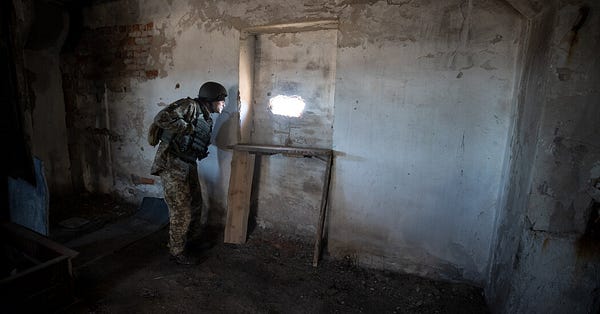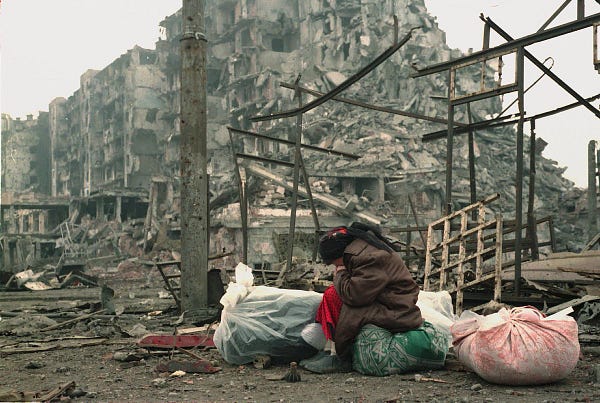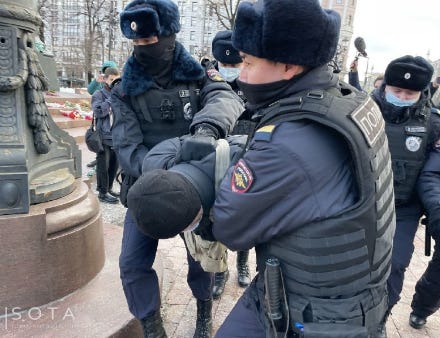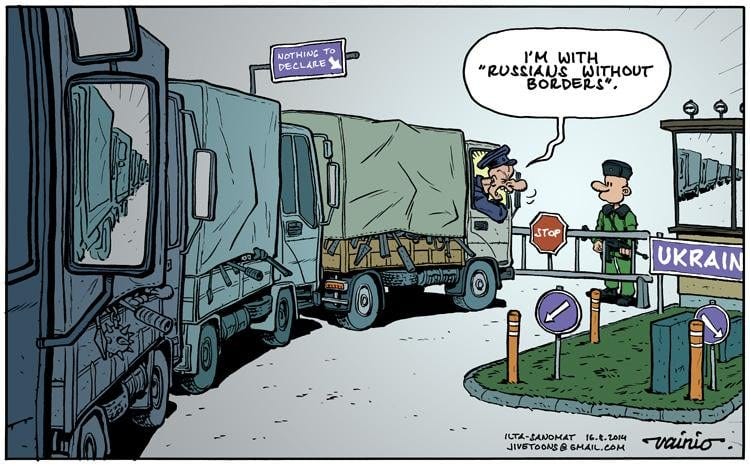The lights are going out in Europe
“The US has intelligence that Russian commanders have received orders to proceed with an invasion of Ukraine, with commanders on the ground making specific plans for how they would maneuver in their sectors of the battlefield, CBS News national security correspondent David Martin reported on ‘Face the Nation’ Sunday.”
Putin launches nuclear drills as US says Russia poised to invade Ukraine. “The Kremlin said Russia successfully test-launched hypersonic and cruise missiles at sea during the nuclear forces drills. Putin observed the exercises on screens with Belarusian leader Alexander Lukashenko from a ‘situation centre.’” (Ed—This is, presumably, meant to deter NATO from getting any ideas when Russia goes into Ukraine.)


Russia planning post-invasion arrest and assassination campaign in Ukraine, US officials say. “The United States has obtained intelligence that Russia may target prominent political opponents, anti-corruption activists, and Belarusian and Russian dissidents living in exile should it move forward with plans to invade Ukraine, as U.S. President Joe Biden warned on Thursday that the threat of a renewed Russian invasion of the country remains “very high” and could take place within the next several days.” (Toomas Hendrik Ilves—“Just what they did in 1940 in Estonia, Latvia and Lithuania and in Poland, Czechoslovakia and Hungary in 1948.”)


Below: Elements of the 106th Guards Airborne Division, filmed in Tula and then on a train near Moscow, going west. @CITeam notes that the airborne vehicles have parachutes fixed. @danvan71 did the geolocation:
“They drink a lot, sell their fuel.” Belarusians give low marks to Russian troops deployed for drills. (Anders Åslund—“This is interesting and important. Apart from a couple of excellent Spetsnaz divisions (25,000 soldiers?), Russian soldiers remain undisciplined and drunk, while the Ukrainian soldiers have become far more serious. The Russian aggressors might be in for a rude surprise.”)



Britain risks danger in flirting with Putin’s friends.
Anticipating that Vladimir Putin will launch another invasion of Ukraine, Britain has introduced legislation to enable the sanctioning of Kremlin-aligned oligarchs in Britain. Foreign Secretary Liz Truss says that if an invasion occurs, oligarchs’ “assets in the UK will be frozen. No UK business or individual would be able to transact with them. And should they seek to enter the UK, they would be turned back.” Yet when pressed on what scope these sanctions would take, the British government remains reticent to offer more details. This has fueled skepticism by some US officials that any new British sanctions will be more focused on symbolism than on punitive action.








(Olga Lautman—“Right after this the breaking news is ‘Donetsk filtration station switched to backup water supply after shutdown due to shelling of one of the pumping stations’- DPR representative offices. Now Russian militants are attacking their water supply.”)




Russian security doesn’t trump the security of Georgians, Moldovans and Ukrainians.
Bond between China and Russia alarms US and Europe. “Current and former US and European officials say they are alarmed over what is effectively a nonaggression pact between China and Russia that could amount to a realignment of the world order. Portending a new type of Cold War, Biden administration officials say the United States will work to create and bolster its own coalitions of democratic nations—including new Europe and Asia-Pacific strategic groups—and help countries develop advanced military capabilities.”
Using corpses, video clips of blown-up buildings, staged Ukrainian military equipment, and actors playing Russian-speaking bereaved, the Kremlin plans to produce a graphic film that would create a pretext for intervention in Ukraine. Meanwhile, Russia has pre-positioned operatives trained in urban warfare to carry out a false-flag attack on its forces in eastern Ukraine, also to fabricate a justification for war. And the Kremlin has developed plans to install a pro-Russian leader in Ukraine, having already chosen a potential candidate.
These are some of the extraordinary disclosures made by the United States and British governments in recent weeks, in near-real-time, as part of a concerted effort to expose Russian President Vladimir Putin’s next moves in Ukraine, and in doing so, disrupt them. They reveal a new understanding in Washington and London that the information space may be among the most consequential terrain Putin is contesting.
RUSSIAN STATE TV IS RIDICULOUS
Anyone who might be watching exclusively Russian state television would never know President Putin has massed his troops on the border of Ukraine, that Kremlin-controlled separatists shelled a kindergarten full of children and Russian forces are in position for an offensive against its beleaguered neighbor. On Kremlin-funded networks, the vision of events is presented not only upside down, but backwards. Panicked pundits blame the United States and Ukraine for the escalation, claim that Russia doesn’t want the war and theatrically ponder: “Why won’t somebody stop Biden?” …
… Having massed its troops and armaments on the Ukrainian border, Russia stands ready to invade Ukraine. On Friday, Kremlin-controlled heads of the self-proclaimed “republics” in Eastern Ukraine (LPR and DPR) started unprovoked evacuations of civilians to Russia, followed by suspicious explosions in the region. Russia’s state media immediately—and baselessly—blamed the Ukrainian military. State TV channel Rossiya-24 reported: “Let’s address the emergency event that took place several minutes ago.” The correspondent present on the scene said, “Everyone is trying to figure out what happened here.” The headline read: “The Ukrainian army struck the gas pipeline in Luhansk.”
What makes this all the more bizarre is that the US had publicly predicted these very tactics.







Elsewhere
Iran MPs put forth conditions for reviving nuclear deal
Online activists are doxxing Ottawa’s anti-vax protesters. “Experts warn this is blurring the line between activism and vigilantism.”

What we’ve been writing:
By Cristina Maza
Andriy Zagorodnyuk was Ukraine’s defense minister from August of 2019 until March 2020. Prior to that, he was head of the Ministry of Defence’s Reforms Project Office for three years. He is now the chairman of the board of the Ukrainian think tank the Center for Defense Strategies. Zagorodnyuk spoke with Cristina Maza about the likelihood of a Russian invasion of Ukraine and what the potential military scenarios may be.
“Right now, thanks to the US and the UK, Ukraine has more anti-tank weapons than Russia has tanks—much more.”
“The West can stop this war. Russia is dependent on Western capital and Western trade. It is a part of the international community. It is not isolated like North Korea or even Iran. If [the Nord Stream 2 pipeline] is stopped, Ukraine controls the shipment of gas to Europe, which for Russia is its lifeblood. Nord Stream 2 is a big deal. The West could also sanction Putin personally. The question is, how determined is the West to stop this war?
Congress balks at Russia-sanctions legislation. With negotiations to craft economic penalties stalled, senators settle for a non-binding resolution backing Ukraine.
US proposals for reform in Bosnia face backlash. Politicians in Bosnia and Hercegovina say Washington is pushing for electoral reform that would reinforce ethnic divisions.









An interesting perspective.
https://asiatimes.com/2022/02/why-russia-wont-invade-ukrainistan/